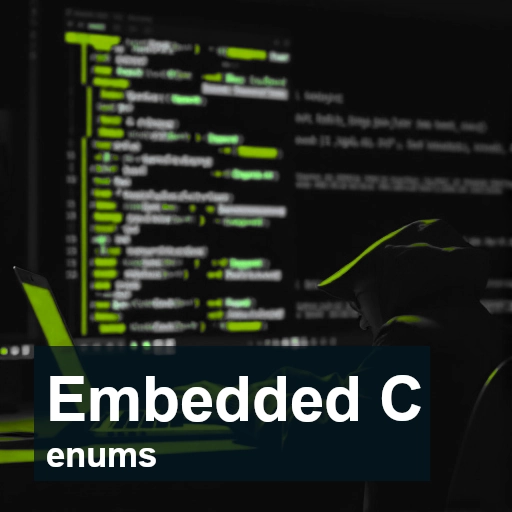In the C programming language, enums (short for enumerations) provide a way to define a set of named integer constants. They are often used to represent variables that can take a limited set of values, making the code more readable, maintainable, and less error-prone. Instead of using arbitrary numbers, you can use meaningful names that represent specific values, making your program more intuitive to work with.
Enums were introduced in C with the ANSI C standard (C89) and have been a part of the language ever since.
Syntax of Enums
The basic syntax to declare an enum in C is as follows:
enum EnumName {
Constant1,
Constant2,
Constant3,
...
};
Here, EnumName is the name of the enum type, and the constants Constant1, Constant2, Constant3, etc., are the values associated with the enum.
For example, consider an enum that represents the days of the week:
enum Days {
Sunday,
Monday,
Tuesday,
Wednesday,
Thursday,
Friday,
Saturday
};
In this example:
- Sunday will be assigned the value 0
- Monday will be assigned the value 1
- Tuesday will be assigned the value 2
- and so on.
By default, the first constant in an enum is assigned the value 0, and each subsequent constant gets the value of the previous constant plus one.
Explicitly Assigning Values
You can also explicitly assign values to enum constants. This is useful if you need the constants to have specific values, such as when working with bit flags or protocol numbers.
enum Days {
Sunday = 1,
Monday = 2,
Tuesday = 4,
Wednesday = 8,
Thursday = 16,
Friday = 32,
Saturday = 64
};
In this case, each constant has been explicitly assigned a unique value. This could be useful, for example, if you’re using these values as bit fields or masks.
Using Enums in C
Once you’ve defined an enum, you can use it like any other variable in C. You can declare a variable of the enum type and assign one of the defined enum constants to it.
#include <stdio.h>
enum Days {
Sunday = 1,
Monday,
Tuesday,
Wednesday,
Thursday,
Friday,
Saturday
};
int main() {
enum Days today;
today = Wednesday;
if (today == Wednesday) {
printf("Today is Wednesday!\n");
}
return 0;
}
Enum Size and Underlying Type
By default, the underlying type of an enum is typically int. However, this can vary depending on the system and compiler. The size of the enum will be at least as large as the largest integer required to represent its values. In some cases, especially with embedded systems, you may want to specify a different underlying type to save memory.
enum Days : unsigned char { // Using unsigned char for smaller memory size
Sunday = 1,
Monday,
Tuesday,
Wednesday,
Thursday,
Friday,
Saturday
};
In this example, the enum Days will be backed by an unsigned char, which uses less memory than the default int.
Enum and Type Safety
While C’s enums offer readability and convenience, they do not provide type safety. This means that you can assign any integer value to an enum variable, even if the value doesn’t correspond to a defined constant.
enum Days today;
today = 10; // This is valid, but it's not one of the defined days
To avoid such mistakes, some programmers prefer to use const variables or #define constants, but this loses the benefits of enums (e.g., clarity and scope). In modern C, techniques like using enum with specific ranges or working within well-defined constant groups can reduce this issue.
Enum in Switch Statements
Enums are commonly used with switch statements to execute different blocks of code based on the enum value. This makes the code cleaner and more readable.
#include <stdio.h>
enum Days {
Sunday = 1,
Monday,
Tuesday,
Wednesday,
Thursday,
Friday,
Saturday
};
int main() {
enum Days today = Friday;
switch (today) {
case Sunday:
printf("It's Sunday\n");
break;
case Monday:
printf("It's Monday\n");
break;
case Friday:
printf("It's Friday\n");
break;
default:
printf("It's a weekday!\n");
break;
}
return 0;
}
Advantages of Using Enums
- Readability: Enums improve the readability of the code by using meaningful names instead of arbitrary integer values.
- Maintainability: If the numeric values of constants need to change, you can modify them in one place (the enum declaration), and the changes will propagate throughout the code.
- Type Safety (partially): Although enums in C do not provide full type safety, they group related constants together, reducing the risk of using incorrect values.
Limitations of Enums
- No Type Safety: C enums are not type-safe, and it’s possible to assign arbitrary integers to enum variables, which could lead to errors.
- Limited to Integers: Enums in C are backed by integers, which means they are limited to integer-like values. This is a significant limitation if you need to assign non-integer values.
- No Namespaces: Unlike some other programming languages, C enums do not support namespaces. If you define multiple enums with the same name in different parts of the program, you could run into conflicts.
Conclusion
Enums in C are a powerful tool for making your programs more readable, maintainable, and less error-prone by using named constants. They help group related values together and make the code more descriptive. While they don’t offer full type safety, and are limited to integer values, they remain a valuable feature in C programming. By using enums effectively, you can avoid magic numbers and hard-to-understand constants, making your code easier to understand for both you and other developers.

